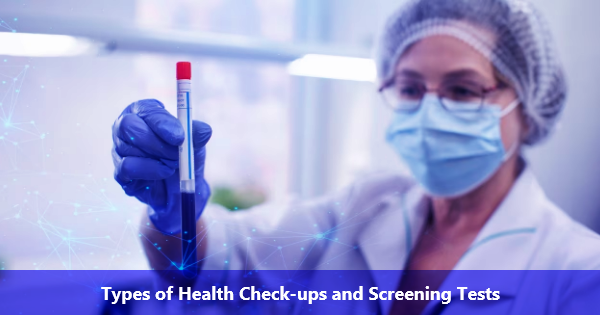The increasing pollution levels, hectic lifestyle and stress all add to the risk of developing diseases that can sometimes even be life-threatening. Hence, It becomes very essential to take the time to pay attention to your body.
Regular check-up that typically involves testing the blood, urine, stool, and simple radiological investigations like x-ray and ultrasound is excellent way to stay on top of your health.
Regular health check-up is also critical to ensure a sound mind and a healthy body, as detecting health-related problems beforehand results in a better chance of treatment and recovery.
Contents
What is the purpose of a health check-up?
The various benefits of a health check-up are as follows:
1. Timely Detection
2. Effective treatment
3. Reduced healthcare costs over time
4. Identifies stress-related problems
5. It keeps you aware and informed.
What are the types of health check-ups and screening tests?
Annual check-ups, immunizations, and flu shots, as well as specific tests and screenings, are a few examples of preventive care. This may also be called routine care.
The following types of health check-ups are recommended keeping in mind the body’s functioning:
● General physical exam including weight, height, blood pressure, pulse rate, visual acuity test, colour vision test, etc.
● Blood tests help determine infections, anaemia, or the onset of other diseases
● Blood sugar test measures blood glucose levels to identify diabetes or pre-diabetes
● Lipid profile helps in assessing cardiovascular risk
● Urine examination helps in the general health assessment in terms of systemic or metabolic diseases.
● Thyroid Profile includes measuring T3, T4, and TSH levels in the body. It is better to opt for thyroid profiling if there are any symptoms such as unexplained weight loss or gain, fatigue.
● Electrocardiogram (ECG) detects heart abnormalities by measuring the electrical activity generated by the heart as it contracts.
● Chest x-ray helps assess the chest and the organs located in the area.
● Ultrasonography helps assess the structures in the abdomen such as the spleen, gallbladder, liver, pancreas, and kidneys.
Cancer Screening: People at the highest risk with family history, smoking, obesity, etc., should opt for cancer screening. Cancer screening comprises tests based on gender, such as PAP Smear and Mammography for females, whereas Prostate-specific antigen tests for males.
Diabetes Check-up: A typical diabetes check-up consists of Hba1c, fasting blood sugar test, CBC (complete blood count), postprandial glucose test, lipid profile, kidney and liver profiling.
Liver and Kidney Check-up: Liver function tests assess the functioning of the liver or diagnose liver diseases. Similarly, kidney function tests evaluate the proper functioning of kidneys.
Heart or Cardiac Check-up: Heart health should be diligently cared for across age groups, especially for individuals who have risk factors such as smoking, hypertension, diabetes, or a family history of heart problems. A typical heart health check-up may include:
● Blood pressure screening
● Blood tests to check cholesterol levels, blood triglycerides, etc. High levels may indicate an increased risk of various health problems, including heart disease.
● Electrocardiogram (ECG) detects heart abnormalities by measuring the electrical activity generated by the heart as it contracts.
● Echocardiography helps to monitor the functioning of the heart and its valves.
Disclaimer:
This blog is for informational purposes only and should not be construed as advice or as a substitute for consulting a physician. It is not a substitute for medical advice or treatment from a healthcare professional.





